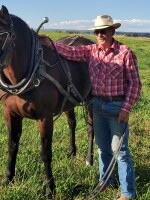As I pointed out last week, concern is rising in agricultural circles about the state of the farm economy, which was borne out recently with the latest Rural Mainstreet Index, which has declined for an eleventh consecutive month. The index is a monthly survey of agricultural bankers in 10 states including Colorado, Illinois, Iowa, Kansas, Minnesota, Missouri, Nebraska, and South Dakota. Creighton University economist Ernie Goss points out that agricultural lenders are concerned about weak agriculture commodity prices and declining exports. He points out that the Chinese economy is moving both sideways to down, which has led to lower U.S. exports of soybeans to China. He also cited tighter credit conditions and higher interest rates that are cutting into the ability of farmers to purchase new equipment, as borne out by the farm equipment sales index for July that plummeted to 19.0, the lowest level in more than seven years and down from 31.8 in June.
Maybe some help is on the way for young farmers from a company that is not usually associated with farming and ranching. PepsiCo Foods North America unveiled the Planting Pathways Initiative last week, which is designed to help expand opportunities in the agriculture industry for young people, who make up just 9% of the U.S. farming workforce. The Initiative will start with pilot partnerships that provide job pathways both on the farm and within the agriculture sector at large. Initial partners include Practical Farmers of Iowa and the Farm Foundation. The multi-year partnership with Practical Farmers of Iowa aims to provide opportunities for underrepresented and beginning farmers to build strong business plans and thrive in the sector. The plan calls for coaching, capital, robust networks and training opportunities for participants. Also, PepsiCo’s partnership with the Farm Foundation, will create a two-year cohort program called Field to Future, giving college students career development support within agriculture.
Soil scientists continue to warn us that soil loss is still significant in the U.S. and that even if farmers follow the U.S. Department of Agriculture's guidelines, soil is lost at rates 25 times higher than the rate at which topsoil forms. A study conducted last year by researchers at Colorado State University’s Department of Soil and Crop Sciences shows the benefits of using regenerative crop practices to prevent soil degradation. The study, compared no-till to conventional till, and the impact on soils when using cover crops and double crops, which can keep soil covered during the entire year, without leaving soil bare and exposed to wind and water erosion. They also found that integrating crop and livestock systems were successful as long-term carbon storage solutions that also increased soil fertility. They pointed out that rather than using a lot of fossil fuel to carry manure from feedlot to spread it on farm ground, the manure of grazing animals is deposited directly on the land where it needs to be.
Virtual fencing is coming to the rescue of the Great Salt Lake wetlands by allowing cows to graze on Phragmites, an invasive plant that has flourished and invaded the wetlands as the lake levels have receded over the past few years. The Nature Conservancy points out that these invasive plants are difficult to control and are a fire hazard.
Theodore Roosevelt wrote, It is not what we have as a great nation: it is the way we use it.



